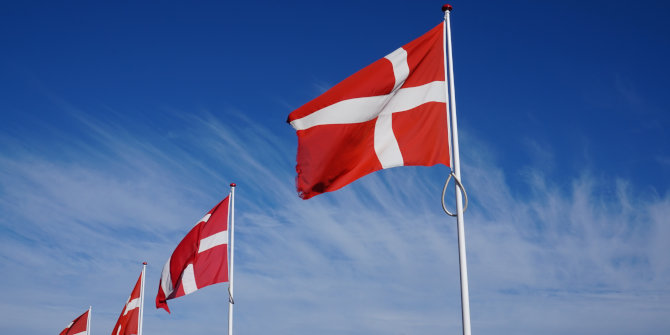Turkey will hold presidential and parliamentary elections on 14 May. Opinion polls suggest President Recep Tayyip Erdoğan is likely to face a strong challenge from Kemal Kılıçdaroğlu and the Turkish opposition. Caglar Ozturk examines what a victory for the opposition could mean for future Turkey-EU relations.
The presidential and parliamentary elections in Turkey on 14 May will hold huge significance for Turkey and the wider world. Turkish voters will decide on the country’s future direction, with many observers characterising the vote as a choice between ‘a restored democracy’ and ‘a crippling autocracy’.
Opposition candidate Kemal Kılıçdaroğlu, from the main opposition party, the Republican People’s Party (CHP), currently has a lead in the polls of around five percent in the first round over incumbent president Recep Tayyip Erdoğan. Kılıçdaroğlu’s candidacy is supported by the Nation Alliance, comprised of six ideologically diverse parties who have a shared aim of defeating Erdoğan’s People’s Alliance.
A victory for Kılıçdaroğlu and the opposition would have major ramifications for Turkey’s domestic politics and foreign policy. The Nation Alliance has prepared a roadmap to tackle many of the key issues facing the country. The most critical changes would take place in relation to governance, with a gradual transition from a presidential system to a parliamentary system being proposed, and in relation to foreign policy, with the alliance planning to fully restore relations with the EU and the United States.
The proposed transition to a parliamentary system would likely take several years to achieve and could require a referendum unless the opposition wins 360 seats out of the 600 in the country’s parliament. However, the foreign policy changes could potentially be far quicker to implement and less contentious. Reviving Turkey-EU relations would be high on the agenda of Kılıçdaroğlu should he win the presidency.
Modernising the customs union
Turkey’s engagement with the European integration process goes back as far as 1959, when the country indicated its intention to become an associate member of the European Economic Community (EEC). Turkey applied to join the European Communities in 1987 and was declared eligible for membership in 1999. This triggered a process of Europeanisation, however in recent years, this process has stalled and there has been a clear deterioration in democratic standards. Turkey’s EU accession negotiations were effectively put on hold in 2018.
Several key issues are expected to shape future Turkey-EU relations. These include updating the customs union between Turkey and the EU, which has been in place since 1995; establishing visa-free travel for Turkish citizens in the EU; and providing support for Syrian refugees in Turkey. These three issues form part of the Nation Alliance’s common policies document and Kılıçdaroğlu has voiced his intention to normalise relations with the EU. Although Turkey formally remains a candidate country, relations are expected to be largely transactional for the foreseeable future and repairing the damage will require substantial effort from both sides.
The existing customs union between Turkey and the EU does not cover agricultural products (processed products are excluded), coal and steel products, services, rights of establishment and public procurement. Efforts to modernise the agreement have been undermined by democratic backsliding in Turkey, particularly after the coup attempt in 2016, as well as tension between Turkey and Greece and Cyprus over territorial disputes in the Aegean Sea. The European Council adopted a positive agenda for improving relations including the modernisation of the customs union in 2020, but this was dependent on Turkey maintaining good neighbourly relations with Greece and Cyprus.
Syrian refugees
Turkey currently hosts more than three million Syrian refugees. Turkey and the EU signed an agreement in March 2016 to prevent illegal crossings via the Aegean Sea towards Greece. According to this agreement, asylum seekers in Greece whose applications for asylum were declined would be returned to Turkey. For every returnee, a Syrian refugee from Turkey would be settled in an EU country. Visa liberalisation for Turkish citizens would be facilitated and the EU agreed to provide €3 billion in support (with a further €3 billion by 2018).
Kılıçdaroğlu has proposed to send refugees back to Syria in two years via a deal between the Turkish and Syrian governments. This would be facilitated according to ‘domestic and international law’. He has criticised the EU for the lack of burden-sharing. According to the common policies document, the Nation Alliance intends to review the March 2016 deal.
It also states that both multilateral and bilateral diplomacy will be used to end the Syrian civil war. Reconstruction of Syria is planned with the help of international donors. The goal is ultimately to end the civil war and improve conditions in the country with a view to encouraging refugees to return. In coordination with the United Nations Refugee Agency, a monitoring mechanism would be established to ensure the safety and rights of returnees in Syria.
Visa-free travel
Turkey is the only EU candidate country whose citizens still require a visa to travel to the EU. A readmission agreement was signed between Turkey and the EU in 2013 and a roadmap for full visa liberalisation was prepared by the EU with 72 benchmarks for Turkey to meet. At present, only a handful of these benchmarks are yet to be met.
Among the remaining benchmarks, reforms related to anti-terrorism legislation are arguably the most contentious given Turkish politics has become increasingly securitised in recent years under Erdoğan’s leadership. Kılıçdaroğlu, in contrast, has committed to meeting the benchmarks in just three months should he win the upcoming elections.
A renewed relationship
If Kılıçdaroğlu and the opposition win power at the 2023 elections, the three issues above are likely to form the immediate focus for establishing a renewed relationship with the EU. While some proposals from Kılıçdaroğlu and the Nation Alliance have the potential to generate opposition from Brussels, Kılıçdaroğlu is open to using diplomacy and dialogue to reach compromises on critical issues.
Additionally, his pledge to return to democracy and ensure the implementation of decisions by the European Court of Human Rights could ease the concerns of those who are concerned about Turkey’s present trajectory. Pursuing constructive dialogue would help foster mutual respect between Turkey and the EU, potentially opening doors to a more institutionalised relationship in future. It is little surprise then that EU leaders will be watching closely as the results start to come in from the 2023 elections.
Note: This article gives the views of the author, not the position of EUROPP – European Politics and Policy or the London School of Economics. Featured image credit: Kurmanbek / Wikimedia Commons (CC BY-SA 4.0)




